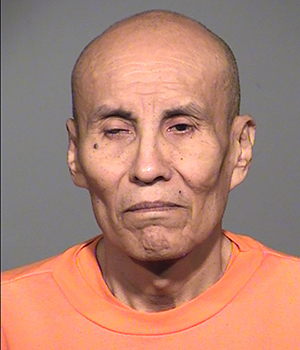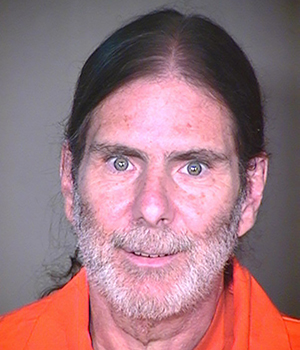
WASHINGTON – While Arizona Attorney General Mark Brnovich is pushing to schedule executions for two death-row inmates who he said have exhausted their appeals, advocates for the men said they still intend to fight.
Brnovich said Tuesday that he plans to seek warrants of execution for Clarence Dixon, convicted in the 1978 murder of a college student in Tempe, and Frank Atwood, convicted for the 1984 murder of a 9-year-old girl in Tucson.
But attorneys for the men said there are still open legal issues that need to be resolved and that their appeals have been “frustrated by the COVID-19 pandemic” since last year.
“The State is now attempting to sweep aside the most profound issues that can arise in our legal system, including whether the convicted is actually guilty of the crime and whether death is a morally or legally tenable punishment in the individual’s case,” said Joseph Perkovich, an attorney for Atwood, in a statement Tuesday.
If the men are executed, they would be the first executions in Arizona since 2014, when the botched execution of Joseph Wood by lethal injection took two hours.

Because their crimes were committed before 1992, both Atwood and Dixon have the choice of lethal injection or execution in the gas chamber. If they do not choose, the state would use a lethal injection of pentobarbital.
Under the schedule suggested to the court by Brnovich, the executions could occur in as little as two months. But one lawyer said the cases are in “uncharted waters.”
Robert Dunham, executive director of the Death Penalty Information Center, acknowledged that the state “has a legitimate interest in not dragging out a case,” but said that does not mean it should rush an execution.
“What we’ve got here is the attorney general attempting to expedite executions in two cases where there is serious doubt about the constitutionality of carrying them out,” Dunham said Wednesday.
According to Brnovich’s office, there are 115 inmates on Arizona’s death row, 20 of whom have used up all of their appeals. In his petitions, Brnovich said that the law requires that the Arizona Supreme Court issue a warrant of execution once post-conviction review of a case has ended.
“Capital punishment is the law of Arizona and the appropriate response to those who commit the most shocking and vile murders,” Brnovich’s Tuesday statement said. “This is about the administration of justice and ensuring the last word still belongs to the innocent victims who can no longer speak for themselves.”
Atwood was on parole for a conviction in California of lewd and lascivious acts and of kidnapping an 8-year-old boy, when he violated his parole and headed to Tucson in May 1984. In September of that year, he kidnapped 8-year-old Vicki Lynne Hoskinson in Tucson as she was riding her bicycle home after mailing a birthday card to her aunt.
Atwood killed her and left her body in the desert before fleeing to Texas, where he was later arrested. In April 1985, a hiker found the girl’s body. Atwood was convicted of murder and kidnapping of Vicki, and was sentenced to death in 1987.
Dixon was already serving a life sentence on another charge when DNA evidence linked him to the previously unsolved 1978 murder of an Arizona State University student.

Deana Bowdoin, 21, was found raped and stabbed to death in her Tempe apartment on Jan. 7, 1978, but police were unable to find her killer. The case went cold for about 20 years before a Tempe police detective used DNA profiling to identify Dixon as a suspect.
Dixon had been sentenced to life for a 1985 Coconino County kidnapping and sexual assault when he was linked to Bowdoin’s death. He was indicted in 2002, and convicted and sentenced to death in January 2008 – just over 30 years after Bowdoin’s death.
Eighteen Arizona organizations opposed to the death penalty wrote to Gov. Doug Ducey Wednesday urging him not to let executions resume in the state. The letter cited the racial disparity in the imposition of capital punishment, its use against intellectually disabled defendants and the fact that 10 Arizona death-row inmates were later exonerated.
The letter also said the state has “badly botched” its most recent executions, including the execution of Wood seven years ago. Prison officials had to administer 15 doses of the lethal two-drug cocktail of midazolam and hydromorphone over about a two-hour period before he was declared dead.
Wood’s execution sparked a lawsuit that led to changes in the way inmates are put to death. Those changes include an open microphone to the witness chamber – critics said witnesses could not hear what appeared to be Wood’s choking and gasping during his execution.
Brnovich also noted Tuesday that the state has secured a supplier of pentobarbital and found a pharmacist to turn the solid drug into a liquid for injection. The names of both are kept confidential by the state to protect them from harassment.
Dale Baich, assistant federal public defender for Arizona, said the future of both death-row inmates is “a little uncertain.”
“We are sort of in uncharted waters,” he said. “This is the first time the attorney general has asked the court to set a briefing schedule when a warrant has been requested.”
Dunham said the state should never be in a rush to execute.
“Arizona should not be in the business of attempting to expedite executions for the political benefit of the attorney general, at the expense of possibly killing an innocent man,” he said. “The paramount concern should be making sure that there is fair process in this case.”
